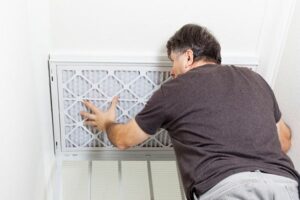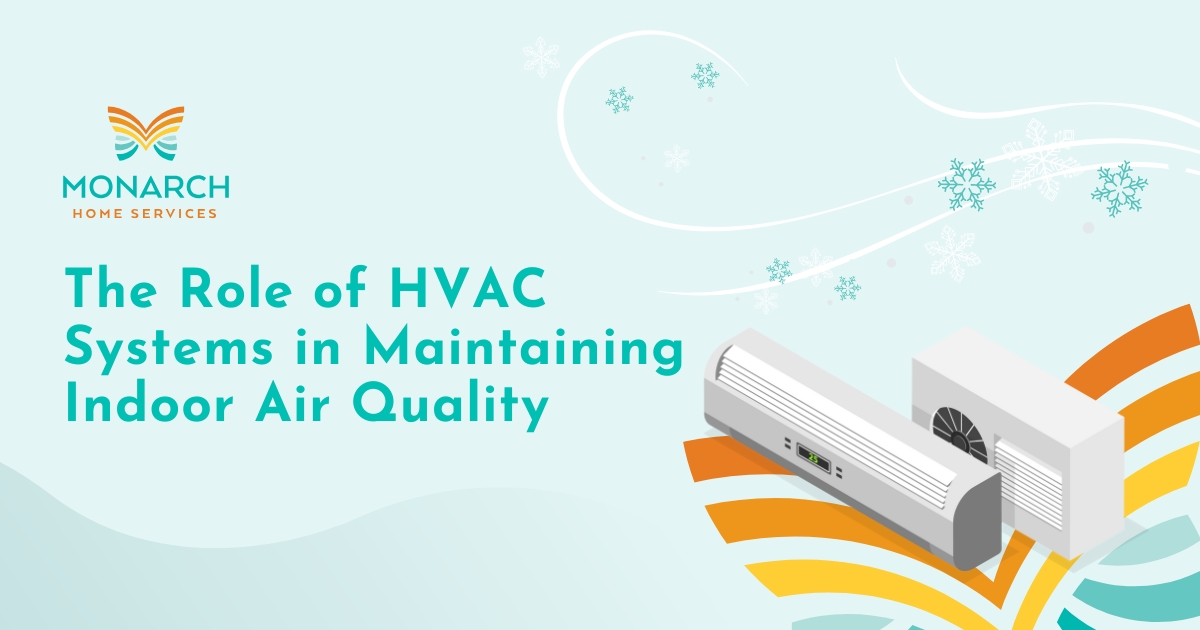We all deserve to breathe easily in our homes, and it begins with your HVAC. Indoor air quality, or IAQ, is crucial for our health and comfort, but it’s sometimes overlooked when we discuss home heating and cooling. In this guide, we’ll review how HVAC affects air quality and discuss considerations for improving yours.

Why Indoor Air Quality Should Matter To Homeowners
We all know that breathing clean air is good for our health. But what you may not realize is the sheer quantity of respiratory contaminants that may be circulating inside your home. From mold spores to pollen, these irritants can cause allergy symptoms and respiratory issues.
Short-term effects of pollutants can also include headaches, fatigue, skin problems, and eye irritation. Long-term exposure can lead to a range of serious health issues, including asthma, heart disease, and cancer.
Common Pollutants Found Indoors
Your indoor air quality is affected by contaminants that come from outside and inside the home. Common indoor air pollutants include:
- Dust and dust mites
- Lint
- Pollen
- Mold spores
- Mildew particles
- Fumes from machinery
- Smoke
- Bacteria
- Virus particles

How HVAC Systems Influence Indoor Air Quality
Certain HVAC systems can be instrumental in improving indoor air quality. By investing in modern HVAC units with current filtration technology, you’ll remove a wider spectrum of contaminants, pollutants, and irritants from your indoor air, helping to reduce health issues and improve home comfort.
Several HVAC solutions for IAQ exist, including using the right air filters, regularly cleaning air ducts, choosing an HVAC system that helps reduce allergens and mold, and investing in a whole-home air purification system.
The importance of Air Filters and MERV Ratings
Of all the things that affect indoor air quality, filtration is arguably the most important. All HVAC systems use air filters to serve dual purposes: Keeping dust and debris out of the unit and improving indoor air quality.
Air filters are measured in their effectiveness using minimum efficiency reporting value (MERV) ratings. HVAC filter MERV ratings range from 1 to 16 — a higher rating means the filter traps smaller particles than lower-rated ones. Though it might be tempting to go for the highest MERV rating available, some filters will limit your HVAC performance due to airflow issues. Choose a filter within your HVAC manufacturer’s recommendations for the optimal balance of HVAC performance and IAQ.
How Air Duct Cleaning Supports Cleaner Air
Another key part of improved IAQ is regular air duct cleaning. Over time, dust, lint, mold, pollen, and other contaminants accumulate in HVAC ductwork. When the system runs, these pollutants stream into the home, affecting respiratory health or causing allergies. We suggest investing in air duct cleaning services at least once a year to prevent this. This ensures your indoor air supply is clean on the output side, working with the air filter to improve IAQ.
Do HVAC Systems Help Reduce Allergens and Mold?
If you use the right system, HVAC systems can significantly reduce allergens and mold in your indoor air. The benefits of air filtration technology have come a long way in the past few years, and modern systems are far more capable of reducing hazardous contaminants from your indoor climate.
Enhancing IAQ with Whole-home Air Purification
Whole-house air purification is another great way to enhance IAQ. These add-on units are installed into your existing HVAC system, cleaning the air as it passes through your ductwork and enters your home. There are a few different kinds, including UV light purifiers and ionic purifiers. Some systems use multiple purification technologies in tandem to eliminate a vast range of contaminants, including viruses, bacteria, mold spores, and smoke particles.
Although these systems are more expensive than even the highest MERV-rated air filters, they’re an excellent investment for people with allergies, asthma, or other related health concerns.
How To Know If Your Home Needs an IAQ Upgrade
Indoor air quality can be challenging to identify without help. The odds are that your air seems fine, so how do you know if the air quality is a reason for concern? We recommend looking into air quality testing services if you or your family members are having the following issues:
- Constantly coughing or sneezing
- Frequently getting sick
- Indoor air feels stuffy and stale
- Unpleasant, lingering odors in the home
- Fast dust buildup throughout the house
- Uneven airflow and circulation in the home
- Inconsistent temperature and humidity
- Increasing energy bills
- Increased HVAC wear and tear
All of these issues indicate a problem with filtration and indoor air quality. Solving them may be as simple as replacing a clogged air filter, or it could mean investing in a more comprehensive purification system.
Why Trust Monarch Home Services for Cleaner Air?
Central California homeowners have entrusted Monarch Home Services with improving their indoor air quality for more than twenty years. Between wildfire smoke, pollution, and natural contaminants like pollen and dust, breathing easily at home is a huge priority for our community’s homeowners.
We help improve your home’s health, comfort, and safety with our full range of IAQ services, including air testing, filter installation, air scrubber implementation, duct repairs and cleaning, air purification solutions, and more. Our technicians are highly skilled and experienced, and we’re available 24/7 for emergency HVAC support. Our customers count on us for courteous service, transparent pricing, and reliable results, and we’re proud to have earned our reputation as one of Central California’s most trusted HVAC service providers.

Monarch Home Services – A Breath of Fresh Air!
If you’re ready to say goodbye to coughing, sneezing, and the risk of other respiratory health problems, we’re here to help. Our indoor air quality services are the best way to improve your IAQ and make your home comfortable. Contact us today to book your residential IAQ service appointment.


